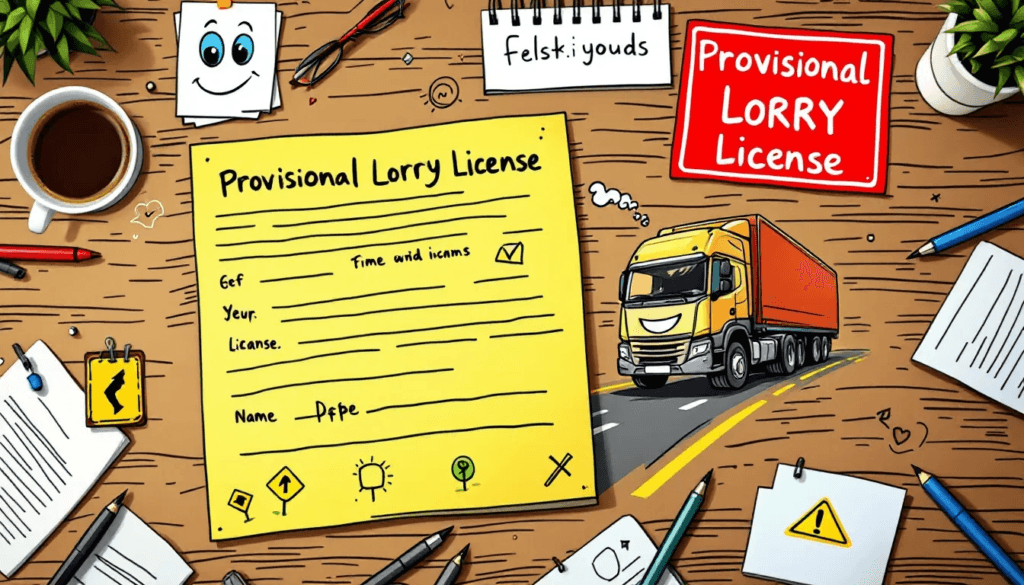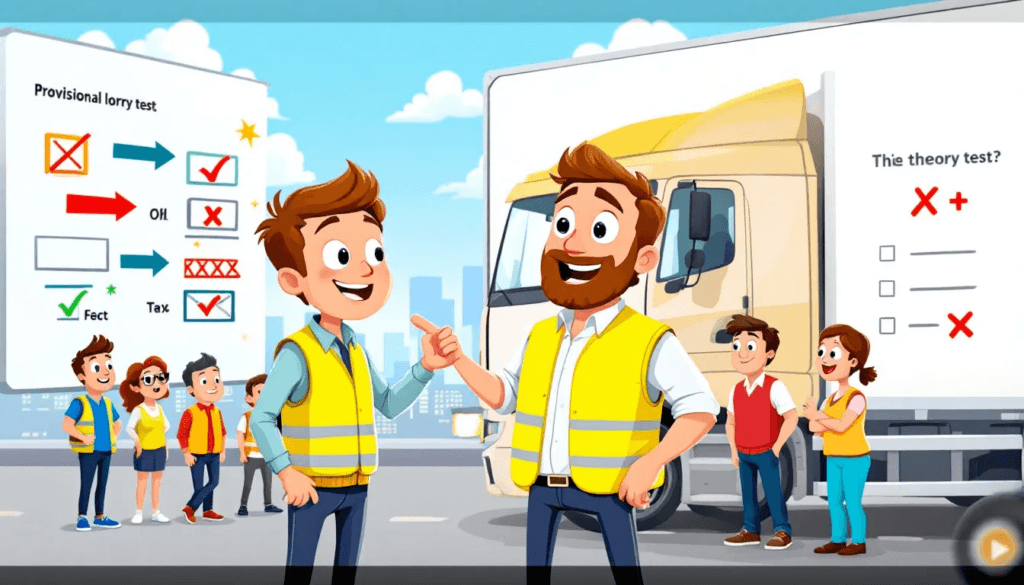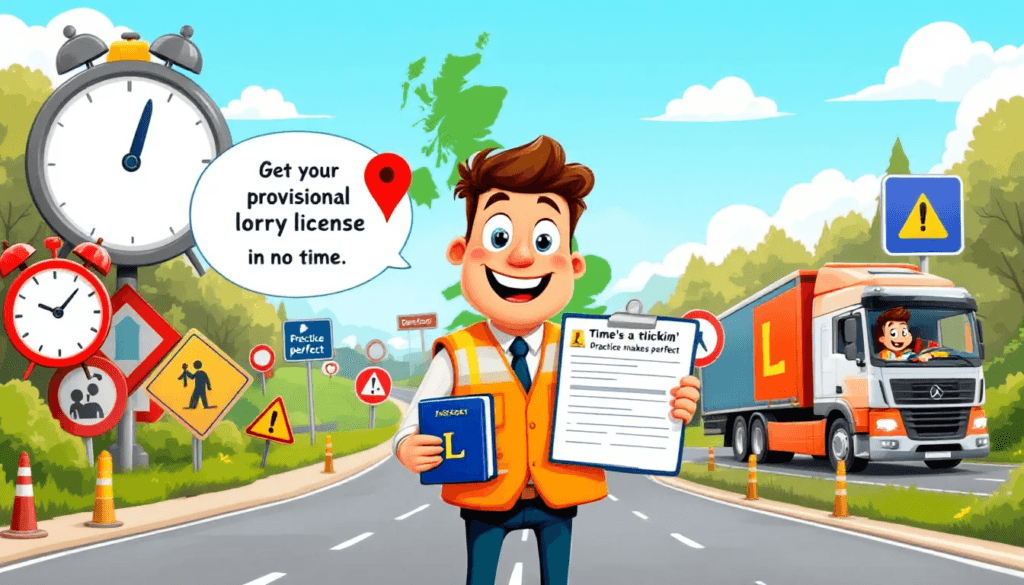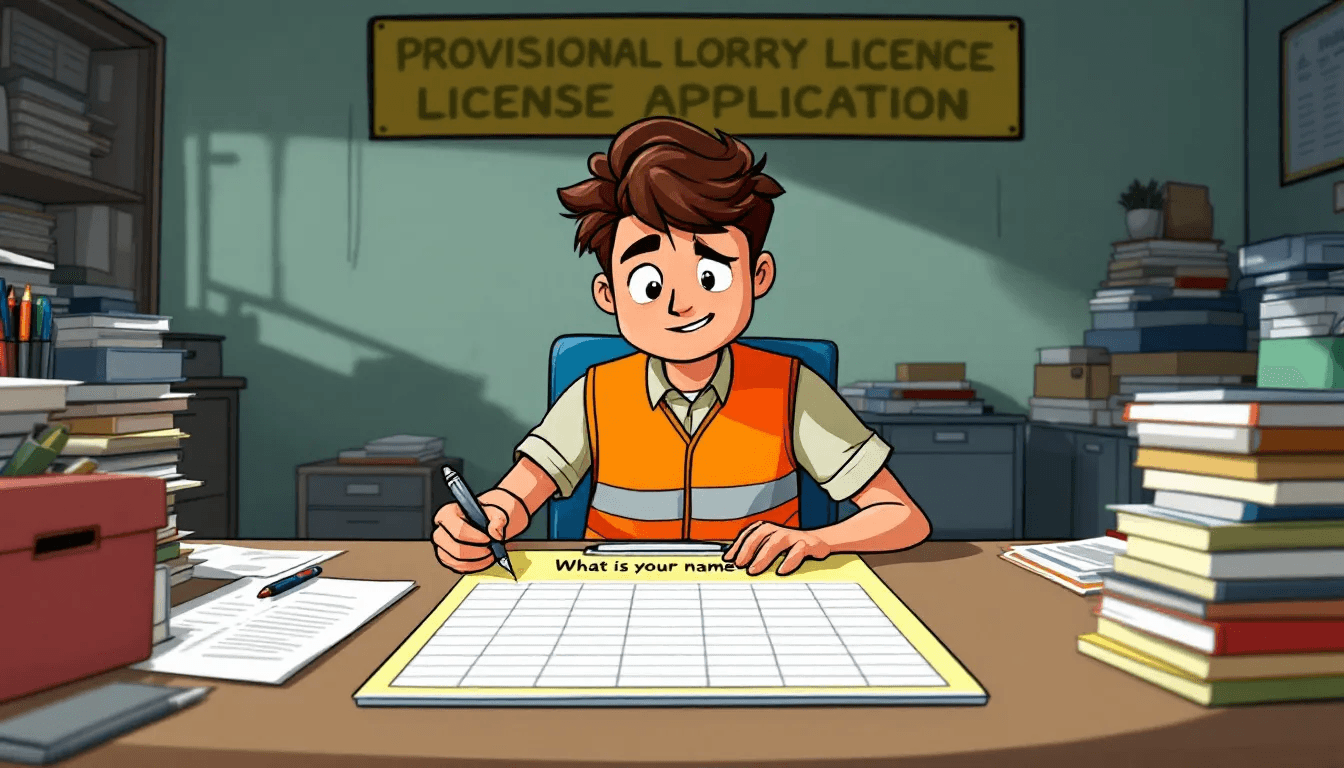If you’re looking to drive larger vehicles professionally, getting a provisional lorry license is your first step. This guide will take you through the application process, including the required documents like the D2 and D4 forms, and the medical examination you need to pass. Understand the steps, costs, and what happens after you get your license.
Key Takeaways
- A provisional lorry license is essential for aspiring lorry drivers to gain supervised driving experience and develop necessary skills.
- The application process requires completing forms D2 and D4, holding a valid full car license, and undergoing a medical examination to verify driving fitness.
- Post-obtainment, drivers must pass a theory test and undertake additional training to enhance driving skills and maintain compliance with regulatory standards.
Why You Need a Provisional Lorry License
Starting a career as a lorry driver requires obtaining a provisional lorry license. More than a legal formality, it’s your gateway to comprehensive driver training and real-world experience. With a provisional HGV license, you can legally drive larger vehicles under supervision, gaining the necessary skills and confidence for your future career as an lgv driver.
Driving with a provisional driving licence involves following specific regulations, like displaying ‘L’ plates and driving under the guidance of a qualified instructor. This setup ensures safe practice while learning to handle a heavy vehicle.
The experience gained with an HGV provisional entitlement and provisional entitlements is invaluable, setting the stage for passing your driving tests and obtaining a full hgv provisional licence.

Required Documents for Provisional Lorry License Application
To apply for a provisional lorry license, you need to submit several key documents. Completing forms D2 and D4 is necessary as they collect essential information about your health and driving history, ensuring you meet the criteria to drive a large vehicle safely.
You must also provide proof of identity, typically using your existing driver’s license. This step verifies your eligibility to apply for a provisional HGV licence and helps streamline the provisional hgv licence application process.
Full Car Licence Requirement
You must hold a valid full car license before applying for a provisional lorry license. This non-negotiable requirement forms the foundation of your driving experience, ensuring you have the basic skills necessary to handle a larger vehicle.
Without a full car license, you cannot legally apply for a provisional lorry license. This ensures all prospective lorry drivers have a standardized level of driving competence before moving to more complex and demanding vehicles.
Medical Examination Report
The medical examination report is crucial for the provisional lorry license application. The D4 form, completed by a medical professional, assesses your physical and psychological ability to drive an HGV safely, focusing on any conditions that could impair your driving.
Your GP or a private medical examiner can complete the D4 form, valid for four months from the date of completion. Regular assessments are required every five years until age 65, after which they must be conducted annually to ensure ongoing fitness to drive.
Steps to Apply for a Provisional Lorry License
Applying for a provisional lorry license involves several steps. First, fill out the D2 form, which collects information about your eyesight and general health. The D4 form provides detailed medical information. Both forms, along with your driving license and proof of identity, must be submitted to the DVLA.
You must also select the specific category of provisional license that matches the type of vehicle you intend to drive. This ensures your training and testing are tailored to the vehicle category’s specific requirements.
Filling Out the D2 Form
The D2 form is vital for your provisional lorry license application, asking for detailed information about your eyesight and general health, including any conditions that might affect your driving. You must declare if you wear glasses or contact lenses to ensure accurate health-related details.

A common mistake applicants make is failing to provide complete and accurate information, especially regarding eyesight. Double-checking your responses and ensuring all necessary health information is included can help avoid delays.
Submitting the D4 Form
The D4 form is crucial for your provisional lorry license application. Completed by a medical professional, it reports the results of your medical examination. Ensuring this form is accurately filled out and submitted is vital for your application’s success.
After completing both the D2 and D4 forms, submit them along with your driving license to the DVLA. This finalizes your application and initiates the review process by the licensing authority.
Processing Time and Costs
Processing a provisional HGV license typically takes around three weeks from when the DVLA receives your application. Expect to receive your license within 14 to 21 business days. However, any errors or omissions can lead to delays, so review your forms thoroughly before submission.
While the application itself is free, be prepared for medical examination fees, which can range from £50 to £150. Ensuring all your details are accurate and complete will help avoid unnecessary delays and additional costs.
What Happens After Obtaining Your Provisional Lorry License
After obtaining your provisional lorry license, the next step is to book your theory test, which consists of two parts: the multiple-choice section and the hazard perception test. Both parts can be taken on the same day, and passing them is crucial to advance in your lorry driving career.
To pass the multiple-choice section, you need a score of 85 out of 100. The hazard perception test involves identifying developing hazards in 19 video clips, with points awarded based on your response time. Passing both parts within two years earns you the theory test certificate, a crucial milestone in your training.
If you fail any part of the theory tests, don’t worry. You will receive feedback on your performance and can rebook the test after three clear working days. This flexibility allows you to learn from mistakes and improve your chances in subsequent attempts.

Training Options for Aspiring HGV Drivers
Training to become an HGV driver involves more than just passing tests; it’s about building practical driving skills and understanding road safety regulations. Accredited Training Institutes offer comprehensive programs that include practical driving and theoretical knowledge, ensuring you are well-prepared for your career.
These programs often include additional courses like CPC driver training and defensive driving, essential for professional competence. Specialized training is also available for handling hazardous materials or transporting passengers, offering tailored instruction for various driving scenarios.
Enrolling in a reputable training program not only boosts your skills but also enhances your employability. Contacting an Accredited Training Institute is the first step toward becoming a proficient and confident hgv training HGV driver.
Practical Test Preparation
Preparing for the practical test is a crucial step in your journey to becoming an HGV driver. This test includes off-road exercises like the S-shaped reverse into a bay, testing your maneuverability and precision. Consistent practice of these skills is vital for success.
Support from experienced professionals, such as those at L&T Training, can provide valuable resources and guidance to help you prepare effectively. Regularly practicing road driving skills will build your confidence and ensure you are well-prepared for the practical test.
The practical test assesses your ability to handle real-world driving situations, so honing your skills through consistent practice and professional guidance is essential. This preparation will help you pass the test and move closer to achieving your HGV driving goals.
Maintaining Your Provisional Lorry License
Maintaining your provisional lorry license involves more than just passing tests; it requires ongoing commitment to training and adherence to regulatory standards. HGV licence holders must complete 35 hours of training every five years to maintain their license, ensuring drivers stay updated on the latest safety regulations and driving practices.
At age 65, the requirements become more stringent, with annual medical assessments needed to ensure ongoing fitness to drive. Failing to maintain a valid Driver CPC card can result in fines, so staying compliant with all renewal and training requirements is crucial.

Summary
In summary, obtaining a provisional lorry license is the first step towards a rewarding career in professional driving. From understanding the application process and required documents to preparing for tests and ongoing training, each step is crucial for your success.
By following this guide, you can navigate the complexities of the application process, prepare effectively for your tests, and maintain your provisional lorry license with confidence. Take the first step today and set yourself on the path to becoming a skilled and professional HGV driver.
Frequently Asked Questions
What documents do I need to apply for a provisional lorry license?
To apply for a provisional lorry license, you must complete and submit forms D2 and D4, provide proof of identity, and possess a full car license.
How long does it take to process the provisional lorry license application?
The provisional lorry license application typically takes 14 to 21 business days to process from the moment the DVLA receives it.
What happens if I fail the theory test?
If you fail the theory test, you will receive feedback and can rebook another attempt after three clear working days. It is essential to take the time to review your weaknesses before retaking the test.
How often do I need to complete medical assessments for my HGV license?
You are required to complete medical assessments for your HGV license every five years until you reach the age of 65, at which point they must be completed annually.
What training options are available for aspiring HGV drivers?
Aspiring HGV drivers have various training options, including practical driving skills, CPC driver training, defensive driving courses, and specialized training for hazardous materials and passenger transport. These options provide a comprehensive foundation for a successful driving career.



